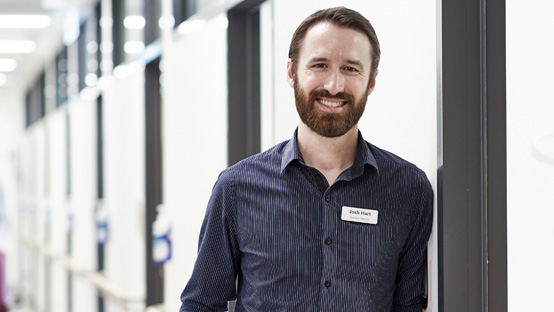"I have been a part of the Peter Mac team for over nine years. I started out in the graduate program that I applied for, sight-unseen, after hearing about how supported and dynamic the graduate program was. The prospect of starting out in a specialty like oncology, coupled with the prospect of a positive and supportive work environment, was very attractive. And the gamble paid off. Peter Mac provided an environment unlike any of my placements, full of positive, education-focused professionals willing to teach. The first years of a nurse’s life are stressful and without the right support, they can be career-ending. The clinical educators, practice development nurses and the graduate nurse support team quickly made it clear that you didn’t need to fix every patient all by yourself and that safety and evidence-based practice are central to nursing excellence. There is a real emphasis on teamwork, knowledge sharing and speaking up if you don’t know something or need help."
Opportunities and support
"During the first four years of my career, there were many opportunities to second into various positions, including a pain and palliative care clinical nurse consultant position. Management at Peter Mac have always been very supportive of practice development opportunities like short-term secondments into other positions around the hospital. After spending four years on the Head, Neck and Lung ward learning how to look after some of the most complex and acutely unwell patients, which provided me with an amazingly solid knowledge base and confidence, I decided to try my hand at radiotherapy nursing in the form of a one of these secondments."
Discovery
"Moving into the outpatients setting was eye opening. It became very clear very quickly that most patient care and movement happen in this context, and with so little emphasis placed on this setting at university, it was a very exciting place to discover. The sheer number of patients that move through each outpatient setting is staggering. In radiotherapy alone there are around 170-200 patients per day. The teams that work in these settings are central to keeping most people being treated for their cancer in the community and out of hospital."
What it means to be a nurse with us
"To me, working in the radiotherapy department has changed what it means to be a nurse. It has its obvious benefits like no night duty and weekdays only (mostly) but the real benefits are the patient-centered ones like the sometimes six to seven weeks (about one and a half months) of continuity of care and the amazing therapeutic relationships that develop, the opportunity to educate patients about positive health behaviors, and be a friendly and highly responsive space for patients to be assessed and treated during an acutely unwell episode. Working in an outpatient setting also allows you to be around patients across almost their entire cancer journey which means that, as a nurse, you get to provide care for patients outside of critically unwell periods and even after they are cured.
After a couple of years in radiotherapy, I became the Associate Nurse Unit Manager of a team that is specialized and knowledgeable and provides innovative radiotherapy nursing care. And now I am the acting Nurse Unit Manager in one of the most high-tech and beautiful buildings in the world. It is an absolute pleasure, and I am so proud to be working in a hospital that doesn’t just have pockets of greatness but is universally positive, enthusiastic, and patient-focused."

